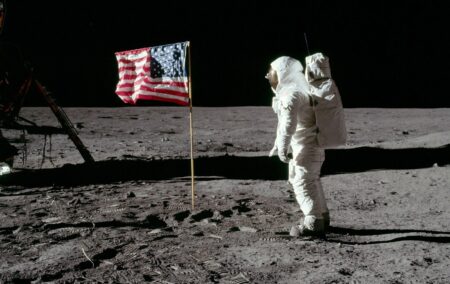Since 1994, our technological progress seems to have ground to a halt.
Fifty years ago today – 21 July 1969 – the first human stepped on to another ‘world’. Most countries had the technology to watch the American spacecraft landing on the Moon. South Africa did not. This was because the Minister of Posts and Telegraphs, Dr Albert Hertzog, forbad television, saying (quite correctly) that it would weaken apartheid by opening the world to ordinary South Africans. (The sanctions campaign against apartheid also wished to isolate South Africa from the world.) So, we could not see the Moon landing and had to listen to it on the radio. My father and I listened over a crackling little radio on the evening of 20 July 1969.
I was enthralled. Outside my own personal experience, it was, and remains, the most thrilling moment of my life. I was in the final year of a physics degree and had been fascinated by the physical sciences since childhood. My father and I craned towards the radio to hear that the spaceship was a mile above the lunar surface. Then half a mile, then 100 yards, then 10 yards. I was beside myself. So was my father, I think, although he was better at containing himself. Then it landed. We rushed to their bedroom where my mother was reading a book in bed. We shouted, ‘They’ve landed on the Moon!’ She looked up and said, ‘Oh, really. Could you make me another cup of coffee?’ Not everybody was excited about space travel.
If you had asked me then to predict space travel by 21 July 2019, I should have said without hesitation: ‘Weekly passenger cruises to the Moon. A colony on Mars. Routine unmanned probes to the outer planets and exploration beyond our solar system.’
Two years later, as a maths and science teacher at a local high school, I found myself adding up the exam marks of six classes of about 40 pupils each. My arithmetic is poor, and I was taking ages to add the totals by hand. Then a fellow teacher came along with something her businessman husband had lent her. It was the size of a small suitcase. She opened the lid to show a row of numbers in red neon lights. She said this machine could add the numbers for me. I was amazed. I added up all the totals in wonderfully short time. I was about to do long division by hand to work out the averages. She said, ‘It can also do multiplication and division.’ I was even more amazed. The machine, I suppose, would have cost about R100 000 in today’s money.
If you had then asked me to predict computation by 21 July 2019, I should have said something like: ‘Perhaps a calculator the size of a cigarette box that could also do logs and exponentials, costing about R10 000.’
I was staggeringly wrong on both counts. The advance of electronics, based on printed circuits, has proceeded with astonishing speed, unprecedented in history, advancing computational power a trillionfold. The advance of many other technologies has been dismally slow. There has been no advance at all in manned space travel since 1969. Apart from frills and gadgets, the modern motor car has advanced little since the Model T Ford of 100 years ago – maybe four times the speed but not much more, and much more difficult to fix if something goes wrong. In 1976, Concorde took passengers from London to New York in 3.5 hours; today the fastest passenger aeroplanes take 7 hours.
South Africa, despite Dr Hertzog, has been on the forefront of some technological advance. Sasol did not invent the coal-to-oil technology but developed it and made by far the biggest such plants on Earth. From about 1969 on, South Africa led the world in building huge, standardised coal stations and burning very poor coal very efficiently; this gave us the cheapest electricity in the world. With our acute water shortage, we led the world in building big air-cooled power stations. We had the world’s first heart transplant. We produced advanced weapons, including the world’s best canon, the G5. The Safari research reactor at Pelindaba near Pretoria, run by the Nuclear Energy Corporation of SA (Necsa) led the world in producing medical radioisotopes for detecting and treating cancer, so saving millions of lives worldwide.
Since 1994, our technological progress seems to have ground to a halt. Eskom, once providing very economic electricity very reliably, is in ruins. Necsa is in trouble and the Safari reactor has been out of action for many months, losing international customers, perhaps permanently. The rapid industrialisation that took place in the bad old days of apartheid is now in decline. I see little sign from our authorities of technical confidence or even of technical interest, except for vague statements from ANC politicians about ‘4IR’ or ‘STEM’ or ‘green energy’ or whatever is the fashionable jargon of the moment.
Andrew Kenny is a writer, an engineer and a classical liberal.
The views of the writer are not necessarily the views of the IRR.
If you like what you have just read, become a Friend of the IRR if you aren’t already one by SMSing your name to 32823 or clicking here. Each SMS costs R1.’ Terms & Conditions Apply.

